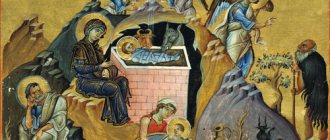Seven deadly sins
I confess how many sins I have (name) to the Lord God and our Savior Jesus Christ and to you, O righteous father, all my misdeeds and all my atrocities that I committed in all the days of my life, which I thought about to this day.” . The “high-white” aliens did not want to mutilate their souls by becoming torturers in hell, so they allowed their anger to be taken out on the underground civilization, for which it is like entertainment. They hate people because they are created “in the image and likeness” of their creators, which is why they are forced to live underground and hide their existence.
Who gets there?
From our parable we see that those who refuse to repent (v. 30), who reject God's word and revelation (v. 31), go to hell. Jesus was clear: he is the way, the truth and the life; no one goes to the Father except through Him. Those who refuse Jesus' offer of eternal life choose hell instead. The Word of God is not negotiable: those whose names are not written in the Lamb's Book of Life are thrown into the lake of fire (Revelation 20.15).
Planets with hidden oceans beneath their crust could be habitable
A simple way to grow a new flower from the stump of a wilted orchid
Scientists and malaria mosquitoes drink human blood
What's going on in hell underground
Hell is located below ground level, in the semi-material world. This world has a different density than ours, so they can exist simultaneously in the same place and not affect each other in any way. Hell is located inside our planet, underground, since it is not as large as Paradise, which is located in the outer space of our solar system, and, in addition, the role of demons in Hell is played by another highly developed civilization living in underground cities and hostile to people .13 Those who do not listen to good advice and do not even listen to the words of the sastras, who are complacent, stubborn, stupid, who consider themselves enlightened - these and many others, very sinful, devoid of righteousness, definitely follow the path of Yama, to Vaitarani. I will tell you which sinners fall into it.
Our sins are grave
List of the seven deadly sins, i.e. offenses for which the sinner, if he does not repent, has a direct road to hell, everyone knows: Pride, Envy, Gluttony, Lust, Anger, Greed and Dejection. The practical implementation of these sins and the severity of the imposed penance depend on a huge number of circumstances and subtleties; the priest often has to be a judge and a psychoanalyst rolled into one.
In the Middle Ages it was simpler - there were canons of repentance: ate a piece of meat on Friday - so many days of fasting and prayer; cursed his neighbor after his mother - so much. The smallest details were taken into account - whether the sinner ate meat alone or in a noisy company, copulated with his wife’s sister by force, for love, or just hugged her in a dark corner.
In Catholicism, “absentee” absolution was widely practiced. Thus, a person who made a pilgrimage to Jerusalem or stood under the banner of a crusade received complete amnesty for all past sins and forgiveness for future ones. The famous “indulgences” - absolution given for money - at one time led the church to a schism.
Wandering monks walked the streets and taverns, offering anyone who wanted to buy heavenly bliss for themselves or their deceased relatives. A whole indulgence is for a year, a quarter is for a month, cut off a piece is enough for a couple of days. And it happened that the robbers first humbly bought a piece of atonement from the holy father, and then immediately, without a twinge of conscience, robbed the klutz. The matter took such a scandalous turn that in 1567 Pope Pius 5 prohibited any grant of indulgences that included any monetary payments.
Bunch
Many of us realize that we have broken God's laws - the Ten Commandments - but believe that there is nothing wrong with it. But let me ask you a few questions about the law you broke and see how bad it is. Have you ever lied? You say you lied. But you think that it was, so to speak, a “white lie” and nothing serious. Have you ever stolen anything? Yes, but it was a small thing, nothing serious. Do you see what you are doing? You minimize your crimes by calling them nothing, and, like Danny, you deceive yourself. In fact, you think that you do not sin, but the Bible warns that “if we say that we have no sin, we deceive ourselves.” The truth is that you lied, which means you are a liar. If you steal something (the value of what you steal doesn't matter), you are a thief. This passion must be countered by abstinence, abstinence from excessive consumption of food and drinks, especially excessive consumption of wine, and observance of fasts established by the Church. The flesh must be curbed by moderate and constant consumption of food, from which all passions begin to weaken, especially self-love, which consists of a wordless love for the body, for life and its peace.
Description of ideas about hell since ancient times
The concept of an afterlife where people's souls experience torment, i.e. about hell is found in almost all ancient beliefs of the peoples of the world. And if their myths say little and rather briefly about the blissful fate of the dead (for example, about the Champs Elysees), then much more and in more detail is told about the torment of people, for example, in Tartarus or another gloomy posthumous prison of souls.
There is nothing surprising about this. Of course, people of the most diverse pagan beliefs had, albeit vague, but still a definite idea of the afterlife of souls. Since all the latter, before the redemption accomplished by Christ on the Cross, went to hell, and the pagans were all tormented there without exception, it is natural that they had precisely this idea of the afterlife, as predominantly in the form of hellish torment.
Useful materials
It is also interesting that some Protestant and secular researchers of the Holy Scriptures argued that the Jews allegedly had no idea about the afterlife of souls, in particular, about hell. And the Hebrew word "sheol" (found in the context of the fate of the dead), which is usually translated as "sheol", meant only "grave" and nothing more.
Which, of course, looks more than strange. It turns out that the pagans, who did not have a supernatural Revelation, had an idea of hell, but the Jews, to whom such a Revelation was given, for some reason did not have such an idea!
Of course, in fact, the Jews, especially, knew about its existence; and their word “Sheol” precisely meant the underworld, i.e. posthumous receptacle of human souls. And although the Holy Scriptures of the Old Testament do not say much about this, since it threatened the Jews as punishment for non-compliance with the Law of Moses, primarily with earthly punishments rather than afterlife, nevertheless, the Bible also says this.
Thus, Orthodox theologians and exegetes refer to the following passage in the Book of Genesis (Gen. 37: 12-35), especially to the last verse of this biblical text. In general, this passage in the Bible tells how the sons of the forefather Jacob acted treacherously with their brother Joseph, selling him into slavery. But they lied to Jacob, saying that Joseph had been torn to pieces and eaten by some wild beast. As false “proof” of this, they took the clothes of the brother allegedly eaten by the beast, smeared it with the blood of the goat they had killed and gave it to his father. Jacob believed them and said:
“With sorrow I will go down to my son into the underworld. So his father mourned for him” (Gen. 37: 35).
In the Hebrew text of the Bible, the word “sheol” is exactly where the word “sheol” is. But it is obvious that it is impossible to translate it as “grave” in this case. For Jacob, having believed his sons that Joseph had been eaten by a beast, could not go to his “grave”, which, as this forefather thought, did not exist.
Naturally, the only correct translation of the word “Sheol” here will be “underworld”, i.e. the place where the souls of all people went after death. For only there after death could the soul of Jacob descend, and only there could he meet the soul of his supposedly murdered son Joseph.
Thus, it is obvious that the Jews, from the earliest times of their existence (since the time of their forefathers), had an idea of the underworld, i.e. about hell. And this idea of theirs, although not directly, was mysteriously reflected in the Old Testament.
But, of course, the most complete concept of hell is given by the Orthodox doctrine.
Don't look for quick answers, learn to live with questions
“Look at anger, what traces of its torment it leaves. Look at what a person does in anger: how he becomes indignant and grumbles, curses and scolds himself, suffers and beats himself, hits himself on the head and face, shakes all over as if in a fever; in a word, he looks like a demoniac. If his appearance is so unpleasant, what is going on in his poor soul? You see what a terrible poison is hidden in the soul, and how bitterly it torments a person! His violent and destructive manifestations speak volumes about him.” Doesn't smoking, which also destroys health, depend on this? Smoking distracts from spiritual life, cigarettes replace prayer for the smoker, suppress the consciousness of sins, destroy spiritual purity, are a temptation for the environment, and are harmful to health, especially for children and youth. Didn't you use drugs?
Questions about hell and heaven
Hieromonk Kirill (Zinkovsky),
candidate of theology, teacher of St. Petersburg Academy of Sciences and Sports, answers them - 90 percent of all believers imagine hell and heaven exactly as Dante described them: completely material.
Similar ideas can often be found in Orthodox literature intended “for the general reader.” To what extent are such ideas acceptable? — First of all, it must be said that the crude ideas of the medieval Catholic West in no way correspond to the patristic Orthodox Tradition. The Holy Fathers of the Church, thinking about heaven and hell, always based their reasoning on the immeasurable goodness of God and never savored in detail (as we find in Dante) either the torment of hell or the bliss of heaven. Heaven and hell never seemed to them to be crudely material. It is no coincidence that St. Simeon the New Theologian
says:
“Everyone imagines hell and the torments there as he wishes, but no one really knows what they are
.
In the same way, according to the thought of St.
Ephraim the Syrian ,
“the hidden bosom of paradise is inaccessible to contemplation
.
Discussing the mysteries of the next century, the Fathers of the Church teach in accordance with the Gospel that Gehenna is prepared not for people, but for fallen spirits rooted in evil, and St. John Chrysostom
notes the educational significance that hell has for man:
“We are in such a disastrous situation “that, if it were not for the fear of Gehenna, we, perhaps, would not even think of doing anything good
.
The modern Greek theologian, Metropolitan Hierotheus Vlahos,
generally speaks of the absence in the teaching of the Fathers of the concept of created hell - thus, he decisively denies those crude ideas with which the French-Latin tradition is full. The Orthodox Fathers also mention subtle, spiritual, “external” heaven and hell, but they propose to pay the main attention to the “internal” origin of the state that awaits man in the next century. Spiritual heaven and hell are not reward and punishment from God, but, accordingly, the health and illness of the human soul, especially clearly manifested in another existence. Healthy souls, that is, those who have worked to cleanse themselves from passions, experience the enlightening effect of Divine grace, and sick souls, that is, those who have not deigned to undertake the work of cleansing, experience a scorching effect. On the other hand, we must understand that, except for God, no one and nothing can lay claim to perfect immateriality: angels and souls, of course, have a nature that is qualitatively different from the visible world, but still they are quite crude in comparison with the absolute Spirit of God. Therefore, their bliss or suffering cannot be imagined as purely ideal: they are linked to their natural structure or disorganization.
- Still, is there any difference between the paradise where the righteous go after death, the Kingdom of God and the future, eternal life after the general resurrection?
— Obviously, there is a difference, since, according to the Holy Fathers, both bliss and torment will increase after the general resurrection, when the souls of the righteous and sinners are reunited with their bodies restored from the dust. According to Scripture, a full-fledged person is a God-created unity of soul and body, therefore their separation is unnatural: it is one of the “wages of sin” and must be overcome. The Holy Fathers reasoned that the very union, the entry of the soul into the body resurrected by God, would already be the beginning of aggravated joy or suffering. The soul, uniting with its bodily members, with which it once did good or evil, will immediately experience special joy or sorrow and even disgust.
- About hell. It is clear why it is called “eternal torment”, but there is also such an expression as “eternal death”... What is this? Nothingness? In general, if all life is from God, then how can those who are rejected by God exist (even in eternal torment)?
— Actually, in the Holy Scriptures there is no expression “eternal death”; the combination “second death”
(Acts 20 and 21).
But they constantly talk about the mystery of “eternal life”
,
the “eternal glory”
of the saved.
The concept of “second” or “eternal” death is explained by the Holy Fathers. So, explaining its secret, St.
Ignatius Brianchaninov o
. This eternal cessation of personal communication with God will be the main suffering of the condemned. St.
Gregory Palamas explains the combination of external and internal torment this way:
“when all good hope is taken away and in despair of salvation, involuntary conviction and gnawing of conscience through crying will immeasurably increase the proper torment
.
Even in hell one cannot speak of the complete absence of God, Who fills the entire created world with Himself, without at the same time mixing with it. “If I go to hell, you are there”
, proclaims the inspired David.
However, Rev.
Maximus the Confessor speaks about the difference between the grace of being and well-being. It is obvious that in hell existence is preserved, but there cannot be well-being. A mysterious depletion of all good occurs, which can be called spiritual death. The creation created by God cannot renounce the gift of existence itself, and the presence of the Creator becomes painful for those who renounce being with Him, in Him and according to His laws.
— Why does the Church talk about two judgments: a private one, which happens to a person immediately after death, and a universal, terrible one? Isn't one enough?
— The soul, entering the afterlife, understands with all clarity that there can be no agreement between good and evil, between God and Satan. In the face of the Divine Light, the human soul sees itself and clearly realizes the relationship between light and darkness in itself. This is the beginning of the so-called private court, in which, one might say, a person judges and evaluates himself. And the final, last, Last Judgment is already connected with the Second Coming of the Savior and the final destinies of the world and man. This judgment is more mysterious, it takes into account both the intercession of the Church for its children, especially through the bloodless liturgical sacrifice offered in the course of history, and the deep omniscience of God about each of His creations and the final determination of every free person in his relationship to God when He appears in front of everyone.
— In our lives, people who deny someone’s love—whether Divine or human—live very well: they, as they say, do not burden themselves with unnecessary problems. Why, after death, denying Divine love, will they suffer? In other words: if a person himself, of his own free will, according to his own taste, chose the path of opposing God, why will he suffer from this?
— The suffering of a person who has rejected God and Divine love, who has rejected Christian self-sacrifice, will consist in the fact that all the infinite beauty of God, who is Love, will be revealed to him. The ugliness of his own egoistic existence will also be revealed to him. Having fully realized the true state of affairs, an egoist will inevitably feel suffering - this is how a freak and a traitor suffers when he finds himself in the company of noble and beautiful heroes. “Those tormented in Gehenna are struck by the scourge of love! And how bitter and harsh is this torment of love!”
- this is how
the saint sees the hellish torment of the fruitless repentance.
Isaac the Syrian . At the same time, it must be emphasized that the self-loving pride in which the inhabitants of hell become ossified will not allow them to admit that they are wrong and the ugliness of the path they have chosen, despite its absurdity. The purpose and meaning of any path are most obvious at its end, just as the quality of a fruit is clear during its ripening, and since hell is the end and the result of an atheistic choice, both the foundations of existence and the bitter consequences of proud and unrepentant resistance to the Creator will become clear in it. .
— Humanly speaking, not all people are remarkably good and not all are hopelessly evil. There are few saints and villains, the bulk are gray: both good and evil (or perhaps, more accurately: neither good nor evil). It seems that we do not reach heaven, but hellish torment is too cruel in our case. Why doesn't the Church talk about any intermediate state?
“It’s dangerous to dream about getting some kind of easy, average place in your future life, for which you don’t have to really strain your will.” The person is already too relaxed spiritually. The Holy Fathers talk about different abodes in heaven and hell, but nevertheless they clearly testify to a clear division at the Judgment of God, which no one can avoid. Probably, many sins of human earthly life can be conditionally called “small”, justified by human weakness. Nevertheless, the mystery of God's judgment is that this judgment will still happen, although God's only desire is general salvation. The Lord “wants all people to be saved and to come to the knowledge of the truth”
(1 Tim. 2:4).
Strictly speaking, we should fear not so much external punishment as internal punishment, not hell as the final condemnation, but even a small insult to the goodness of God. Elder Paisios of Athos
has the idea that not many will go to hell, but even if we escape it, what will it be like for us to appear before the Face of God with an uncleaned conscience? This should be the Christian's main concern.
In addition, it is important to understand that upon entering the spiritual world, a lightning-fast struggle takes place in the human soul between the darkness and light living in it. And it is unclear what the result of this battle of incompatible forces will be, revealing their essence, hidden until death under the “veil of flesh.” This internal confrontation itself is already painful for their bearer, and it is generally difficult to say how suffocating the victory of inner darkness over light is.
— And also about “small sin.” Is it really possible to go to hell for eating a cutlet during Lent? For smoking? Because he occasionally allowed himself some not quite decent thoughts (not actions)? In a word, for the fact that I was not pulled into line every second of my life, but sometimes allowed myself to “relax a little” - by human standards, is it completely excusable?
“The point is not in the apparent cruelty of God, who is supposedly ready to send to Gehenna for minor human weakness, but in the mysterious accumulation of the power of sin in the soul. After all, a “small” sin, although “small,” is committed, as a rule, many times. Just as sand, consisting of small grains of sand, can weigh no less than a large stone, so a small sin gains strength and weight over time and can weigh on the soul no less than a “big” sin committed once. In addition, very often in our lives, relaxation “in small things” imperceptibly leads to large and very serious sins. It is no coincidence that the Lord said: “... faithful in little is also faithful in much.”
(Luke 16:10). Excessive tension and pettiness often even harm our spiritual life and do not bring us closer to God, but demandingness in our attitude towards ourselves, our spiritual life, our attitude towards our neighbors and towards the Lord Himself is natural and obligatory for a Christian.
Questions asked by Alexey Bakulin
Underground, but the soul is close to God
To start with a clean slate, you need to ask the Creator for forgiveness for all bad deeds from childhood to the present, you need to remember and sincerely repent. Spiritual individualism, the tendency to retire to prayer (even during the Divine Liturgy), forgetting that we are members of the Catholic Church, members of the one mystical Body of Christ - all this is interconnected. Are we not sinning by satisfying our human passions, thoughtlessly imitating the lifestyle and behavior of the people around us, including those who exist in the church environment, but are not imbued with the spirit of love, pretending to be pious, falling into hypocrisy and pharisaism? How do we treat our family members, people with whom we often meet or work? Are we able to tolerate their weaknesses? Do we often get angry? Are we arrogant, touchy, intolerant of other people's shortcomings and opinions?
Be gone, Satan!
Speaking of exorcism, it is a hellishly difficult ritual. Contrary to numerous science fiction films and TV series, where the exorcism of the devil is carried out by anyone and any way, a real priest will not get involved with Satan. If you have not received the appropriate blessing or are not overwhelmed by the spirit of pride (which, as you remember, is a mortal sin).
In Russia, such rituals, with the blessing of the Patriarch, are allowed to be carried out only in Sergiev Posad, in the Church of Peter and Paul. Residents of Ukraine should contact the Kiev Pechersk Lavra. The mentioned exorcism course in the Vatican graduates from 6 to 12 demon fighters per year. That's all.
If a priest who has not received a blessing undertakes the rite of exorcism, this leads to unnecessary torment, and sometimes even to the death of the “possessed”, often suffering from schizophrenia or other mental illness, and not associated with the devil.
So in 2005 in Romania, the priest Daniel Petru Corogeanu, in the process of exorcizing demons, killed his mentally ill parishioner. To save her from the machinations of Satan, the exorcist chained the girl to a cross for three days. When the police arrived, the parishioner had already given up the ghost. And in 2022, a pastor from Nicaragua, Juan Romero, burned a 25-year-old girl alive for the same purpose.
No elders, grandmothers, witches, shamans or Winchester brothers can perform exorcism. At best, they themselves went over to the side of evil, at worst, they are simply swindlers. And an ordinary parish priest is unlikely to be able to distinguish a mentally ill person from a possessed one. If such a suspicion suddenly arises in him, before waving the censer, he must contact the diocese and receive a blessing for a reprimand (they are given very rarely).
...If you are offered, for a reasonable fee, to drive demons out of your car, coffee maker or bank safe, to reprimand you for your unhappy love of vodka, beer and fatty donuts, to cure you of obsession with grandmother’s prayers and sacred amulets - with a clear conscience, send the home-grown demon killers to hell!
PASSIMO 2022
Atheists, of course, can be considered heretics, as was the case with Pope Anastasius II, who wanted to bridge the gap that separated him from the Eastern Church after the schism. He was ready to recognize as legitimate baptisms performed by the Eastern Church. If God does not punish in this life those who oppose Him, against the servants of God, then on the Day of Judgment they will face severe punishment. Everyone should know that they will get what they deserve. God loves everyone. God is waiting for everyone. He waits for the person to repent. But when a person no longer has a feeling of repentance, when the soul has become completely hardened, then sudden death occurs. Demons take this soul and drag it straight to hell. Sometimes such people commit suicide.
Damn you
One of the common superstitions of the Middle Ages was the idea that especially hardened sinners were dragged by devils to hell alive. Numerous miniatures and short stories vividly describe moneylenders, corrupt judges and expensive whores, followed by horned judges.
The theologian Bede the Venerable saw the devil making eyes in the monastery toilet. The French Baron Corras had as his servant the imp Orton, who looked like a skinny pig. Hundreds of demons that possessed nuns from the Louden monastery drove several abbots to suicide, unable to cope with devilish temptations. I would like to hope that hellish guests no longer come to Earth, but the newspapers claim the opposite.
Vatican exorcists are exhausted in the fight against evil spirits that inhabit not only people, but also homes and household appliances. In 2004, a new exorcism course was even opened at the Vatican University. And Monsignor Angelo Mascheroni, the chief exorcist of Milan, in a commentary for the British “The Independent” said that over the past 15 years the number of calls to diocesan exorcists asking for help has doubled.
20th century Satanist leaders Aleister Crowley and Jean Mansfield claimed to have personally communicated with the Lord of Darkness.
Mike Tyson said many times in an interview that he saw the devil in a drunken stupor. For more than a hundred years, residents of New Jersey have been talking about a local devil with a horse's head and leathery dragon wings - he supposedly comes to hardened sinners, with his vile appearance reminding them of the torments of hell and urging them to repent. And the devil appeared to the boys from Costa Rica right during a poker game - the poor children swore off taking cards in their hands until the end of their days...
I wonder if hell does not exist, then where do the devils come from who visit sinners on earth?
NEWS
We sin in word, deed, thought, all five senses, knowledge and ignorance, will and lack of will, reason and lack of reason, and there is no way to list all our sins in all their multitude. But we sincerely repent of them and ask for the help of grace to remember all our shortcomings, forgotten and therefore unrepentant. We promise that, with God's help, we will henceforth guard ourselves, avoid sin, and perform acts of love. Lord, forgive us and free us from all sin, according to Your mercy and Your long-suffering, and bless us so that we accept Your holy and life-giving Mysteries not for judgment and condemnation, but for the healing of soul and body. Amen. And then I entered the seminary. I knew that Claudia was being persecuted, the newspapers were haunting her. Her house was under constant surveillance: nearby, two or three houses away, there was a two-story police building. She talked with some fathers at the Trinity-Sergius Lavra and was summoned. She sold her house in Barnaul and bought a house in Strunino. Her son has grown up and now serves in the city of Alexandrov.
Angry rottweiler
In this passage of the Bible, hell does not appear to be a place of torment for sinners. It looks more like an abandoned warehouse of old, unwanted rags. Only instead of rags, there are dead people in hell. Remember this point, it is important for our further conversation. * Disobedience. Do we sin when we disobey our parents, elders in the family, or bosses at work? Do we not obey the advice of our spiritual father, do we shy away from the repentance that he imposed on us, from the spiritual medicine that heals the soul? Do we suppress remorse in ourselves, do we fail to fulfill the law of love?
Subtleties of translation
The Four Gospels were written in Aramaic, then translated into Greek and Latin and, naturally, the subtleties of the text were lost in translation. Famous: “ It is sooner for a camel to go through the eye of a needle than for a rich man to enter the kingdom of God.”
" spoke of the narrow gates of Jerusalem, and not of the real eye of the needle. And the lovely Eve did not pick an apple, but a “fruit” and theologians are still arguing whether it was a pomegranate, an orange or a carob. The 21st century is preparing for us new translations and a new understanding of the sacred text.
“The Lord has given us eternal love, so no one will go to some kind of hell. Not because villains should not be sent there, but because the hand of the Lord will raise us from any hell
“, said Lutheran Bishop of Roskilde Jaan Lindhard recently.
Theologians have once again raised the question: does hell really exist, or has Christianity been the victim of an error by an unknown translator from Aramaic for many centuries in a row?
Hell
The first description of hell in the Bible is found in the prophet Isaiah: “The hell of the underworld has arisen for you. and you have become powerless, like us! and you became just like us! Your pride with all your noise has been cast into the underworld; the worm is under you, and the worms are your covering... you are cast into hell, into the depths of the underworld..... All the kings of the nations lie with reverence, each in his own grave; and you are thrown beyond your grave like a despised branch, like the clothing of those killed, put to death with the sword, thrown into a stone ditch; you, like a fallen corpse, will not unite with them in the grave; for you have destroyed your land, you have destroyed your people: the tribe of the wicked will never be remembered.” (Isaiah 14:9-20). Now one elder archimandrite lives in the Pochaev Lavra. His cell was built just below Fr. Isaacia. He heard everything they said and saw everything the robbers did, but he could not help - the mountains got in the way. Then he descended into the abyss - Isaac was already dead.
Hellish parable
Jesus' most hellish parable (Luke 16:19-31) contains two symbols: a rich man and a very poor beggar. At opposite ends of the spectrum, here and in eternity. This is how history moves.
First we meet the rich man. He is a very rich man and also a religious man. He is “clothed in purple and fine linen.” This means that his outer clothing was dyed purple and his inner clothing was made of Egyptian woven linen. Jesus is literally describing the most expensive clothing of his time—a $2,000 suit, as we would say.
He "lives in luxury every day." The Greek says that he lives lampro, which means brilliantly, magnificently. He is obviously one of the leading public figures of his time, well known and popular.
And he, apparently an observant Jew, called upon “Father Abraham” (v. 24), as did the pious Jews of his time. There is no mention of breaking the law here. Obviously, he is a typically religious person. Rich and religious.
St. Petersburg and other regions with the largest increase in crime in 2020
The craftswoman showed what beauty she makes from egg trays: there’s no shame in giving as a gift
A cold turned out to be able to partially suppress the coronavirus: scientists’ conclusions
Our other character is “the beggar named Lazarus.” His name, ironically, means “God helps.” He is the only named character in all of Jesus' parables. Society knew the name of the rich man, but we do not know. Nobody knew the beggar's name, but we know. God too. Lazarus' body was thrown into a smoldering landfill (gehenna), but his soul went to heaven. The rich man was buried with honors, but his soul fell into inferno.
From the sobering story of Jesus we discover several important facts:
- Our souls do not die with our bodies.
- Our souls are conscious after death.
- The righteous are immediately sent to a place of happiness after death, while the wicked are immediately punished.
- Wealth does not keep us from death or hell.
- There is a place of suffering beyond the grave - hell.
- There will never be any salvation or end in hell.
- God gives us sufficient warning to prepare for death.
- And God will give us nothing to warn us.
Now, based on the story of Jesus, let's ask a few questions.
He was proud
He sinned: through unbridled mental and physical attachments, impurity of soul and body; entertainment and putting off impure thoughts, addictions, lust, immodest looks at women and boys; in a dream, nocturnal adultery, unrestrained marital life. A person is a kind of vessel. The Bible, Scripture, Koran, Torah and other books repeatedly confirm this. And this is reality. The human body is 71% water. And what is especially noteworthy is that our body contains 2% fresh water. Exactly the same as on the globe. And other proportions of chemical elements in our body coincide with the proportions of the Earth. Such a coincidence is “in the image and likeness”.
CULTURE
“. For God so loved the world that he gave his only begotten Son, that whoever believes in him should not perish, but have eternal life. For God did not send His Son into the world to judge the world, but that the world might be saved through Him. He who believes in Him is not condemned, but he who does not believe is already condemned, because he did not believe in the name of the Only Begotten Son of God. “. Thus, according to the Bible, the New Testament curse falls on those who do not accept the sacrifice of Jesus Christ. Such people will go to hell. “The beginning of pride is usually contempt. He who despises others and considers them nonentities - some poor, others low-born, others ignorant - as a result of this contempt comes to the point that he considers himself wise, prudent, rich, noble and strong.
Can a person first go to hell and then to heaven?
Yes it is possible. Moreover, from the Holy Scriptures and Holy Tradition we know that this has happened, and on a massive scale, once in the history of mankind. After all, as already mentioned, the Lord, after His Resurrection, brought out from the underworld all the Old Testament righteous people and those sinners who, hearing His preaching in hell, believed in Him. All these people first went to hell, and then were taken out of it by the Savior to heaven.
According to Orthodox doctrine, prayers, alms and other good deeds performed in his memory by relatives and friends can still lead a sinner out of hell. This happens when the deceased was an Orthodox Christian, lived virtuously, but somewhere in his life he sinned without repenting, missed something, did not do something good or did not do something good... And if his sins were not very great, then He is, so to speak, in the “upper sections of hell,” where the torment is not the most severe.
When relatives and friends pray for him, give alms and do other good deeds in his memory, then this good is imputed to both them and the deceased. And when, thanks to this, his virtues outweigh his sins on the scales of God’s justice, the soul of such a sinner can be taken from hell to heaven.
Some, if my memory serves me right, Athonite ascetics even saw an image of such a journey from hell to heaven. When an angel sent by God removed the soul of such a sinner from hellfire in the form of a completely burnt brand. The angel shook off all this soot and ashes, under which there was a beautiful soul, which was taken by this celestial being to heaven.
Partly because of this, prayers and alms are necessary for our deceased relatives and loved ones. True, if a person’s sins are especially serious, then this care for his soul will not allow it to enter heaven, but, in any case, will reduce the severity of its punishment in hell.
There is such an instructive story about this. Two righteous sisters-nuns had a brother - a villain and a robber. He died without repentance, and when the sisters prayerfully asked God, they saw him chained by his hands and feet to some stone, tormented in hellish fire.
With tears, they prayed to the Lord for their brother for forty days, after which they saw how one of his hands was freed from the shackles. So they prayed for their brother several more times for forty days, each time seeing how one of his limbs was freed. Finally, after another such forty-day prayer, they saw that their brother was no longer on that stone. At first they thought he was out of hell. But by revelation from God they learned that thanks to their prayers this unrepentant, grave sinner was transferred to that hellish place where the torment was less severe.
It is very similar to the Orthodox teaching about the possibility of bringing the soul of a not very serious sinner out of the underworld through the prayers and alms of his relatives and loved ones...
Heresy
* Heresy and superstition. Heresy is a false teaching concerning the spiritual world and communication with it, rejected by the Church as clearly contrary to Scripture and Tradition. Personal arrogance, excessive confidence in one's own mind and personal spiritual experience often leads to heresy. Heretical opinions and judgments can also be caused by insufficient knowledge of church teaching and theological ignorance. The power and poisonous smell of these images, bewitching and shameful, are so strong that they expel from the soul all the sublime thoughts and desires that previously captivated (the young man). It often happens that a person is unable to think about anything else: the demon of passion has completely taken possession of him. He cannot look at any woman as anything other than a woman. Dirty thoughts creep into his dull mind, and in his heart there is only one desire - to satisfy his lust. This is already the state of an animal, or rather, worse than an animal, because animals do not achieve the depravity that a person achieves.”
When do they go to hell?
Our parable makes it clear that they are punished immediately. They were then sentenced to eternal hell at the final trial. Paul taught the same thing (Thessalonians 1:9-10): “They will be punished with everlasting destruction and excluded from the presence of the Lord and from the greatness of his power in that day when he comes to be glorified among his holy people and admired among all who believe.” “When they stand before God at the final judgment, if anyone’s name has not been written in the book of life, they are thrown into the lake of fire” (Revelation 20:15).
This is the current reality. Dr. Charles Garfield has done extensive research with those who died physically and were medically restored. His results were amazing. According to him, many of the dying patients interviewed reported negative visions (demons, etc.).
Dr. Maurice Rawlings talks about one of his patients, a man who died three times. At the time of his first death, he saw such terrible things that he experienced a religious conversion. His second clinical death a few days later produced a miraculous, heavenly experience. After his third and final death, he reassured his doctor.
“Prayer is the coolest thing ever.” – 25 live quotes from Peter Mamonov
* Sensual thoughts and temptations. Have we struggled with sensual thoughts? Have we escaped carnal temptations? Have we turned away from seductive looks, conversations and touches? Haven’t we sinned through unbridled mental and carnal affections, through pleasure and lethargy in unclean thoughts, through lust, through immodest glances at people of the opposite sex, through self-abuse? Don’t we remember with delight our former sins of the flesh?” The “high-white” aliens did not want to mutilate their souls by becoming tormentors in hell, they allowed the underground civilization to release their anger in a way for which it was entertainment. They hate people because they are created “in the image and likeness” of their creators, which is why they are forced to live underground and hide their existence.










